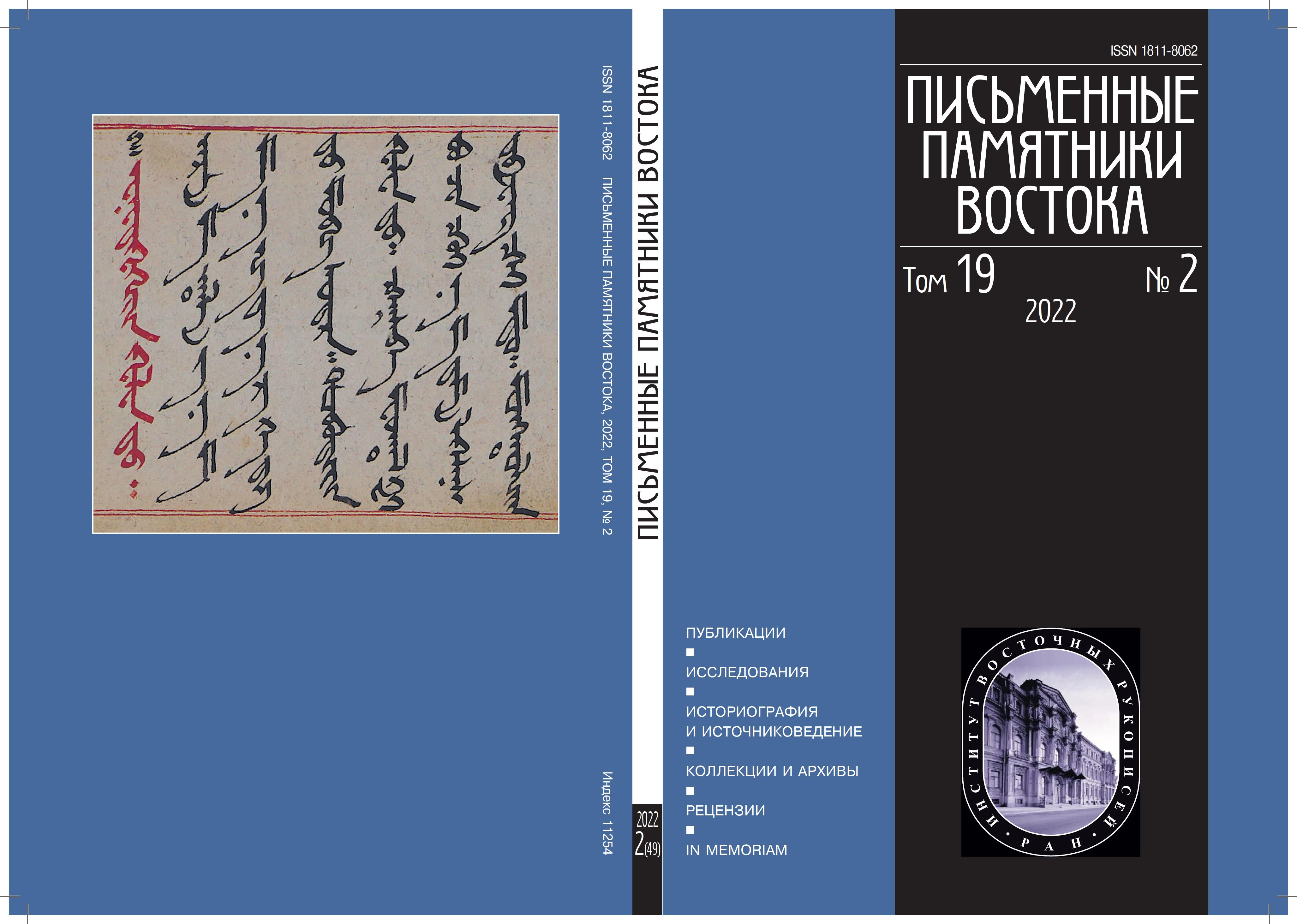Маньчжурско-китайский цзыди шу «Как ели краба». Перевод с маньчжурского и китайского, предисловие и комментарии
- Авторы: Пан Т.А.1
-
Учреждения:
- Институт восточных рукописей РАН
- Выпуск: Том 19, № 2 (2022)
- Страницы: 20-36
- Раздел: Публикации
- Статья опубликована: 23.06.2022
- URL: https://journals.eco-vector.com/1811-8062/article/view/106540
- DOI: https://doi.org/10.55512/WMO106540
- ID: 106540
Цитировать
Полный текст
Аннотация
Возникновение письменных памятников на маньчжурском языке связано с появлением маньчжурской письменности в начале XVII в. К непереведенным с китайского языка текстам обычно относят художественные произведения, шаманские камлания, народные тексты и сказания. Необычным примером оригинальной маньчжурской литературы являются короткие рассказы, написанные в жанре цзыди шу 子弟书, иногда переводимом как «молодежные книги» — куплеты, исполнявшиеся под аккомпанемент трехструнных инструментов в чайных домах Пекина, Шэньяна и других городов. Его особенностью является то, что текст составлен на смешанном маньчжурско-китайском языке: какие-то слова говорились по-маньчжурски, какие-то — по-китайски. Редкий текст цзыди шу «Как ели краба» был издан С. Вэдли в 1991 г. Его особенностью является то, что он записан на обоих языках и является примером смешанного языка, на котором говорили знаменные маньчжуры в Пекине. Часть текста записана маньчжурским шрифтом, часть — китайскими иероглифами. При этом рядом с маньчжурскими словами дан китайский перевод. Описание житейской ситуации изобилует подробностями маньчжурского быта, и этот юмористический текст был популярен среди знаменных маньчжуров. В статье предлагается впервые переведенный на русский язык текст с комментариями.
Ключевые слова
Об авторах
Татьяна Александровна Пан
Институт восточных рукописей РАН
Автор, ответственный за переписку.
Email: ptatiana@inbox.ru
ORCID iD: 0000-0002-2597-2530
http://www.orientalstudies.ru/eng/index.php?option=com_personalities&Itemid=74&person=66
кандидат исторических наук, ведущий научный сотрудник, заведующая Отделом Дальнего Востока, заместитель директора по научной работе
Россия, Санкт-ПетербургСписок литературы
- Гуань, Чжоу 1984 — Гуань Дэдун 关德栋, Чжоу Чжунмин 周中明。 Цзыди шу цун чао 子弟
- 書叢鈔 (Собрание цзыди шу). Шанхай 上海: Гуцзи чубань-шэ 古籍出版社, 1984.
- Лю 2008 — Лю Сяомэн 刘小萌. Циндай Бэйцзин цижэнь шэхуй 清代北京旗人社会 (Знаменное общество в Пекине при династии Цин). Бэйцзин 北京: Чжунго шэхуй кэсюэ чу-баньшэ 中国社会科学出版社, 2008.
- Чжан Шоучун 1999 — Чжан Шоучун 張壽崇. Маньцзу шочан вэньсюэ цзыди шу чжэньбэнь бай чжун 滿族説唱文學∶子弟書珍本百种 (Маньчжурская песенная литература: сто драгоценных цзыди шу). Бэйцзин北京: Миньцзу чубаньшэ 民族出版社, 1999.
- Wadley 1991 — Wadley Stephen A. The Mixed-Language Verses from the Manchu Dynasty in China. Bloomington: Indiana University Research Institute for Inner Asian Studies, 1991 (Papers on Inner Asia, no. 16).
Дополнительные файлы









